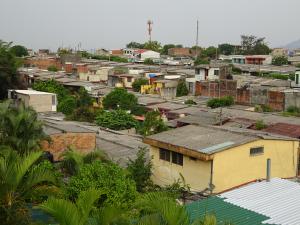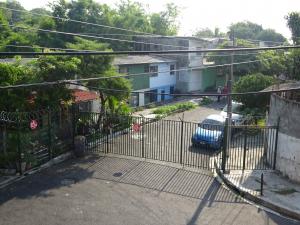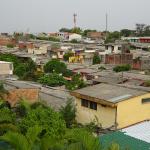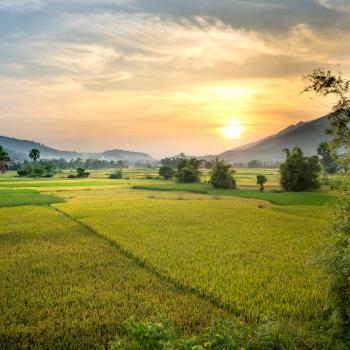A deep red stain on the sidewalk caught my attention as I walked with the pastor of the local parish while he showed me around the neighborhood. He noticed my sudden attention toward the red stain and calmly said as if talking about a trip to the beach, “poor boy, they killed him yesterday.” I was stunned. The red stain was blood. The pastor continued to explain that this young man was the security guard of the neighborhood and he always stood at the gate located at the neighborhood’s only entrance. He had consistently refused entry into the area to local drug gang members, so they shot him. The man left behind a wife and young daughter.
During my four day stay in El Salvador for the beatification of Archbishop Romero I learned about the rampant violence experienced by the citizens of the country. My encounter with the young man’s blood on the first day was a chilling introduction to this reality. I learned about children recruited by drug gangs and cartels, children having to walk the long way to school to avoid certain neighborhoods, kidnappings, and countless deaths of innocent men and women who were in the wrong place at the wrong time. I learned that the largest gangs present in El Salvador were founded in the United States, primarily in Los Angeles, by children of displaced Salvadorans who fled the country during its civil war.
Having experienced an excruciatingly debilitating civil war from 1980 to 1992, the violence experienced during the war continues to wreak havoc in society. The country has one of the highest homicide rates in the world and is among the most violent. Unfortunately the United States played a significant role in the deterioration of this society in the 1980s by pouring billions of dollars in support to a military-backed government that not only killed leftist guerrilla members, but also killed countless of innocent citizens with scorched-earth tactics.
As the world recently anxiously followed every step of the rescue of twelve Thai boys trapped in a cave, I wish the world would also follow closely the senseless violence present not only in El Salvador, but in Central America. Just as the world came together to rescue the Thai children sparing no expense, how can the world come together to rescue millions of children trapped in cycles of violence that not only reduce their future opportunities, but often crush and kill them?
It can be easy to be dismissive of this extreme suffering, or to blame some person or institution for it. We can say it is someone else’s problem. It is easy to look the other way, becoming harsh and heartless in the face of such pain. When I see the body of three-year old Syrian Alan Kurdi dead on the shore of the Mediterranean Sea, when I read of one-year old Honduran Johan separated from his father when crossing the Mexico-US border having to represent himself in US immigration court (yes, a one year old), when I see a blood stain on the street of a neighborhood and all continues as normal, I feel great pain and see the need to speak on the behalf of those suffering. This is the solidarity Pope John Paul II spoke often about; solidarity which reminds us that we all belong to the same human family, making us commit to the common good. This is the good of all and of each individual, because we are responsible for all. The violence ravaging Central America must be addressed, and the starting point may be compassionate hearts in those who are able to make a difference.
Pictures are mind. All rights reserved. San Salvador, 2015.














